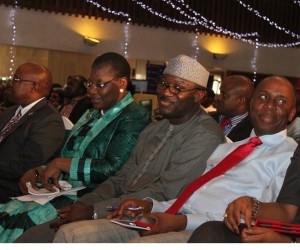
L-R: Mrs Obiageli Ezekwesili, Vice-President, World Bank, Lead-in Speaker and Governor of Ekiti State, Dr Kayode Fayemi; and his River State Counterpart, Mr. Rotimi Amaechi, during the Maiden Edition of The Future Awards Symposium (TFASymposium), in Lagos... on Monday
Nigerian youths have been told that the new Nigeria of their dreams would not be realised by mere wishes and criticism but by developing a new orientation and taking positive steps at transforming the country.
Ekiti State Governor, Dr. Kayode Fayemi, his Rivers State counterpart, Rotimi Amaechi, Minister of Youth Development, Mallam Bolaji Abdulahi and World Bank Vice President for Africa, Dr. Obiageli Ezekwesili gave the charge on Monday at a Symposium for Young and Emerging Leaders organised by The Future Project and First Bank at the Muson centre, Lagos.
Speaking to the highly elated youths on “The challenge of responsible leadership: How can a successor –generation do better”, Ekiti State Governor, Dr. Kayode Fayemi said youths cannot afford to stand with hands akimbo and expect the desired change to come; adding that they must “move from idealism to pragmatism” to achieve this.
Dr. Fayemi who made a strong case for the grooming of the younger generation for successive and responsible leadership decried the desperation of some politicians “to do virtually anything to capture and retain power” as a guarantee to “national cake”; adding that “this prevailing theatre of the absurd has greatly impaired our nation’s journey to national greatness.”
Hundreds of youth and leaders of youth organisations had converged on the Muson Centre, Onikan, Lagos, venue of the one day symposium, which featured presentations by some public officials and youth leaders as well as question and answer session.
Fayemi told the gathering: “It is instructive to note here that where there is no deliberate and carefully planned succession process in political leadership, there can be no hope for sustained development. The Singaporean experience provides us a good example. Singapore’s systematic and painstakingly planned political succession sharply contrasts with succession in most new democracies.”, Fayemi said.
The Governor attributed failure to groom responsible leadership to the subversion and collapse of public Institution, especially the University system under military rule in the last twenty years; saying that this rendered political positions as an “arena for the highest bidder no matter how ill-prepared and integrity deficient.”
While urging youths to play their roles in the political process, Fayemi said if we as citizens choose not to play a part in the process of developing our communities and our country, we will get the politicians we deserve, allow the hijack of the political realm by special interests and ethnic jingoists who are keen to promote their narrow agenda.
“ This is why I want us to really focus more on the making of leaders and citizens in a good society because without direct citizen participation, the legitimacy of our political institutions will continue to decline. It is for this reason that I strongly believe that political leaders- be they politicians or young activists should worry because their ability to lead effectively is being seriously undermined by the desertion of average citizens from public space, deepening the crisis of legitimacy in our State.”
Earlier, the Governor of Rivers State, Rotimi Amaechi had pointed out that the political structure of Nigeria was responsible for the high level of corruption in the country; saying that many of the leaders who are seen as bad were people of good intention hindered by the structure.
Amaechi said education became a major way to tackle corruption but lamented that primary education still remained in the hands of Local Government without adequate fund and manpower, hence the poor foundation that cannot address corruption.
He added that for Nigeria to develop like its neighbouring country Ghana where many Nigerian investors have sited their businesses, every Nigerian, regardless of age, must continue to live and discourage corruption.
World Bank Vice President for Africa, Dr. Obiageli Ezekwesili who spoke on “Benchmarking Economic performance over the past half-century” pointed out that good governance is the only way to promote the growth of any nation, even as she said that systematic corruption has taken away the collective vision of Nigeria.
Comparing their Gross Domestic Product per capital, Ezekwesili added that at the time of independence in 1960, Nigeria was doing better than Indonesia, Malaysia and Singapore only to remain stagnant after losing sight of its vision for the future.
The World Bank vice president added that most youths have been disconnected from government but urged them to see corruption as a tax we must be tired of paying .
Last modified: March 21, 2012
